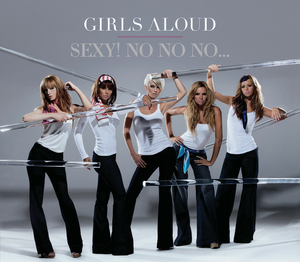
Girls Aloud are a British pop girl group that was created through the ITV talent show Popstars: The Rivals in 2002. The line up consisted of members Cheryl Tweedy, Nadine Coyle, Sarah Harding, Nicola Roberts and Kimberley Walsh. In 2012, the group was named as the United Kingdom's biggest selling girl group of the 21st century so far, with over 4.3 million singles sales and 4 million albums sold in the UK alone. During their two decades together, the group achieved a string of twenty top ten singles on the UK Singles Chart, including four number ones. They also achieved seven certified albums, two of which debut at number one. They have been nominated for five Brit Awards, winning the 2009 Best Single for "The Promise".
Xenomania is an English songwriting and production team founded by Brian Higgins and based in Kent. Formed by Higgins with his Creative Director Miranda Cooper and Business Director Sarah Stennett of First Access Entertainment, Xenomania has written and produced for artists such as Cher, Kylie Minogue, Dannii Minogue, Sophie Ellis-Bextor, Pet Shop Boys, The Saturdays and Sugababes. In particular, all but one of Girls Aloud's studio albums have been entirely written and produced by Xenomania. Sugababes' "Round Round" and Girls Aloud's "Sound of the Underground" have been credited with reshaping British pop music for the 2000s. Gabriella Cilmi's "Sweet About Me" and Girls Aloud's "The Promise" were named Best Single at the ARIA Music Awards of 2008 and the 2009 BRIT Awards, respectively.

What Will the Neighbours Say? is the second studio album by English-Irish all-female pop group Girls Aloud. It was released in the United Kingdom on 29 November 2004 by Polydor Records. Brian Higgins and his production team Xenomania were enlisted to produce the entire album, allowing for more inventive ideas. What Will the Neighbours Say? explores various subgenres of pop music.

Sound of the Underground is the debut studio album by English-Irish girl group Girls Aloud, formed through the ITV television series Popstars: The Rivals. It was released in Ireland on 23 May 2003, in the United Kingdom and Europe on 26 May 2003, and reissued on 17 November 2003 through Polydor. Girls Aloud worked with a variety of musicians and producers on Sound of the Underground, which was largely inspired by 1980s music. Comparisons were made with artists such as Bananarama, The Bangles, Blondie and Spice Girls.

Chemistry is the third studio album by English-Irish girl group Girls Aloud. It was released in the United Kingdom on 5 December 2005 by Polydor Records. After the success of What Will the Neighbours Say?, the album was again entirely produced by Brian Higgins and his production team Xenomania. Chemistry is a loose concept album which details celebrity lifestyle and "what it's like to be a twentysomething girl in London." A number of the songs avert the verse-chorus form typical of pop music.

"Sound of the Underground" is a song that was the debut single of British-Irish pop group Girls Aloud, and later featured on their debut album of the same title. The song was written by Miranda Cooper, Brian Higgins and Niara Scarlett, and produced by Higgins and his production team Xenomania. Following Girls Aloud's formation on the ITV1 reality television show Popstars: The Rivals, "Sound of the Underground" was released 16 days later, on 16 December 2002. Commercially, it was an immediate success; it became the year's Christmas number one in the UK, spending four consecutive weeks atop the chart. It also reached number one in Ireland and peaked within the top forty in Australia, Belgium, the Netherlands, Sweden and Switzerland.

"No Good Advice" is a song by British-Irish girl group Girls Aloud, taken from their debut album, Sound of the Underground (2003). The song was written by Aqua's Lene Nystrøm Rasted, Miranda Cooper, Brian Higgins and his production team Xenomania, and produced by Higgins and Xenomania. The song has themes of rebellion, reflecting Higgins' general mood of failure after a business partnership fell through.

"The Show" is a song recorded by British girl group Girls Aloud for their second studio album, What Will the Neighbours Say? (2004). It was released by Polydor Records on 28 June 2004, as the lead single from the album. The song was written by Miranda Cooper, Brian Higgins, Lisa Cowling, Jon Shave, and Tim Powell. The synth rhythm, composed by Shave, represents a change in musical direction from the band's previous releases. "The Show" is an uptempo dance-pop, electropop and Eurodance song with elements of the 1990 rave records.

"Love Machine" is a song recorded by British girl group Girls Aloud from their second studio album, What Will the Neighbours Say? (2004). It was released by Polydor Records on 13 September 2004, as the second single from the album. The song was written by Miranda Cooper, Brian Higgins, Tim Powell, Nick Coler, Lisa Cowling, Myra Boyle, and Shawn Lee. The instrumentation was inspired by The Smiths, and created by Powell and Coler. "Love Machine" is an uptempo pop rock song with elements of 1980s synthpop. The single was received favourably by contemporary music critics, who deemed it a joyful track that was different from the single releases by other artists at the time. According to research carried out for Nokia in 2006, "Love Machine" is the second "most exhilarating" song ever.

"Wake Me Up" is a song recorded by British girl group Girls Aloud from their second studio album, What Will the Neighbours Say? (2004). It was released by Polydor Records on 21 February 2005, as the fourth and final single from the album. The song had been initially considered as the lead single, however, it was deemed to sound too harsh and the record company did not want to take the risk. The track was written by Miranda Cooper, Brian Higgins, Tim Powell, Shawn Lee, Lisa Cowling, Paul Woods and Yusra Maru'e. "Wake Me Up" is a pop rock song composed of a "garage rock guitar riff". It received mixed reviews from music critics. While some described it as predictable, others wrote that it appeared to be an attempt to recapture the sound of some of their previous release. Alex Kapranos, the lead singer of indie rock band Franz Ferdinand, said "Wake Me Up" inspired the band to work with producer Brian Higgins.

"Long Hot Summer" is a song by English-Irish all-female pop group Girls Aloud, taken as the first single from their third studio album Chemistry (2005). The song was written by Miranda Cooper, Brian Higgins and his production team Xenomania, and produced by Higgins and Xenomania. "Long Hot Summer" was written for inclusion in the Disney film Herbie: Fully Loaded (2005), but plans fell through. Higgins later described the track as "a disaster record." Released in August 2005, it became Girls Aloud's first single to miss the top five on the UK Singles Chart, peaking at number seven.

"See the Day" is a song by English singer Dee C. Lee, released as a single on 21 October 1985. On 2 December it peaked at number 3 on the UK Singles Chart where it stayed for two weeks. The single sold in excess of 250,000 copies, receiving a silver certification, and became Lee's biggest hit single and her only UK top-40 hit, peaking at number three. "See the Day" also charted in Australia, the Netherlands, and West Germany. The B-side of the single, "The Paris Match", features Lee's future husband Paul Weller and his band the Style Council, of which Lee was a part-time member.

"Whole Lotta History" is a song by British all-female pop group Girls Aloud, taken from their third studio album Chemistry (2005). The song was written by Miranda Cooper, Brian Higgins and his production team Xenomania, and produced by Higgins and Xenomania. Described as "a lush ballad", "Whole Lotta History" was slightly remixed and released as a single in March 2006. It continued Girls Aloud's string of hits by becoming their twelfth consecutive single to chart within the top ten on the UK Singles Chart.

"Something Kinda Ooooh" is a song by British all-female pop group Girls Aloud, taken from their first greatest hits collection The Sound of Girls Aloud: The Greatest Hits (2006). The song was written by Miranda Cooper, Brian Higgins and his production team Xenomania, and produced by Higgins and Xenomania. Inspired by 1980s pop and George Michael, "Something Kinda Ooooh" was released as a single in October 2006. It returned Girls Aloud to the top three of the UK Singles Chart for the first time in two years. It also made Girls Aloud the first British act to debut in the top five on the chart based on legal download sales alone.

"Sexy! No No No..." is a song by British girl group Girls Aloud from their fourth studio album, Tangled Up (2007). In April 2007, the group announced that they would release a new album, due in November of that year. In July 2007, it was announced that "Sexy! No No No...", due to be released in September, would be as the first single from Tangled Up, with a radio premiere scheduled for 20 July. The track leaked a few hours prior to the premiere. "Sexy! No No No..." was written by Girls Aloud and Xenomania, and is an electropunk song that incorporates a sample of Nazareth's 1975 song "Hair of the Dog", for which they received a writing credit. Composed of three songs welded together, the song avoids the verse-chorus form present in most contemporary pop music, similar to their previous single "Biology" (2005).

"Call the Shots" is a song by British-Irish girl group Girls Aloud from their fourth studio album, Tangled Up (2007). The song was written by Miranda Cooper, with inspiration from an article about the advance of women in business, and Brian Higgins, Tim Powell, Lisa Cowling, and Giselle Somerville also received songwriting credits. Polydor Records originally intended to release it the lead single for The Sound of Girls Aloud: The Greatest Hits (2006); however, "Something Kinda Ooooh" was selected instead. In September 2007, "Call the Shots" leaked online, and on 26 November of the same year, it was released as the second single from Tangled Up through Fascination Records, a week after the album's release.

Tangled Up is the fourth studio album by English-Irish girl group Girls Aloud. It was released through Fascination Records and Polydor Records on 16 November 2007, and was distributed in two physical formats and made available for digital consumption. The album is a pop record that incorporates elements of dance-pop, synthpop, and various EDM sub-genres produced by long time-collaborators Brian Higgins and production team Xenomania. Marking a more mature approach according to group member Cheryl, the album lyrically delves into themes of love, relationships and femininity, and it was the group's first experimentation with tools such as autotune and vocoder. Production and development began with each member meeting with Higgins to discuss their personal and professional experiences since the release of their third album Chemistry (2005). It was recorded separately from April to October 2007, with the band members earning songwriting credits for two tracks off the album.

"Can't Speak French" is a song performed by British-Irish all-female pop group Girls Aloud, taken from their fourth studio album and serving as the third and final single from the album Tangled Up (2007). The song was written by Miranda Cooper, Brian Higgins and his production team Xenomania, and produced by Higgins and Xenomania. Described as "a swirling, slower cut with great jazzy guitar changes," Higgins said it was "the easiest Girls Aloud single they made." Upon its release in March 2008, "Can't Speak French" charted within the top ten on the UK Singles Chart, continuing their five-year streak of top ten hits.

"Here We Go" is a pop song written by Miranda Cooper, Brian Higgins, and Matt Gray, originally recorded by Cooper under the alias Moonbaby. The song was initially released as Moonbaby's first single in 2000, later being covered by Lene Nystrøm in 2003 and Girls Aloud in 2004. A version with rewritten lyrics appears as the theme music of the French/Canadian animated television series Totally Spies!.

"The Loving Kind" is a song by English-Irish girl group Girls Aloud, taken from their fifth studio album Out of Control (2008). The song was written by Pet Shop Boys, Miranda Cooper, Brian Higgins and his production team Xenomania, and produced by Higgins and Xenomania. Described as a "synth-pop ballad", "The Loving Kind" was originally written for inclusion on Pet Shop Boys' Yes (2009) before being given to Girls Aloud. Upon its release in January 2009, "The Loving Kind" peaked at number ten on the UK Singles Chart, thereby continuing their six-year streak of top-ten hits.



















